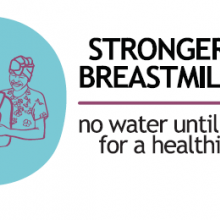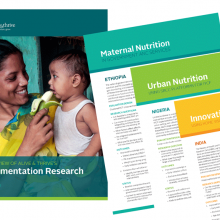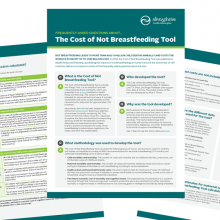Journal article
Dec 08 2020

Mistakes from the HIV pandemic should inform the COVID-19 response for maternal and newborn care (Gribble, K., 2020. International Breastfeeding Journal)
During the COVID-19 pandemic, policy makers and practitioners must learn from mistakes made during the HIV pandemic, when breastfeeding was undermined through isolating infants from their mothers, and formula feeding resulted in more infant deaths than the disease.
Poster/Graphic, Handout
Nov 10 2020

Stronger with breastmilk only campaign resources
In 2019, UNICEF, the World Health Organization and Alive & Thrive launched a regional campaign to increase the rate of exclusive breastfeeding across West Africa - the Stronger With Breastmilk Only initiative.
Brief, Handout
Oct 28 2020

An overview of Alive & Thrive's implementation research
Alive & Thrive's implementation research spans its program areas, seeking to answer "how" to implement effective interventions and policies. Active studies are detailed in the attached documents.
Handout
Oct 14 2020

Frequently Asked Questions about the Cost of Not Breastfeeding tool
Not breastfeeding leads to more than half a million child deaths annually and costs the world economy up to US$1 billion a day.
Journal article
Jul 16 2020

Early breastfeeding practices contribute to exclusive breastfeeding in Bangladesh, Vietnam, and Ethiopia (Nguyen, P.H., 2020. Maternal & Child Nutrition)
Data from three impact evaluations of large-scale social and behavior change communication (SBCC) interventions in Bangladesh, Vietnam and Ethiopia were used to examine whether early initiation of breastfeeding (EIBF) and non-prelacteal feeding are associated with increased prevalence of exclusiv
Journal article
Jul 16 2020

Predictors of exclusive breastfeeding and consumption of soft, semi-solid or solid food among infants in Boucle du Mouhoun, Burkina Faso: A cross-sectional survey (Cresswell, J., 2017. PLOS ONE)
Many mothers have low levels of knowledge regarding breastfeeding and demonstrate poor practices, according to this cross-sectional survey (n = 2288) of a representative sample of women aged 15–49 years with at least one live birth in the past year conducted during June and July 2015 in the Boucl

